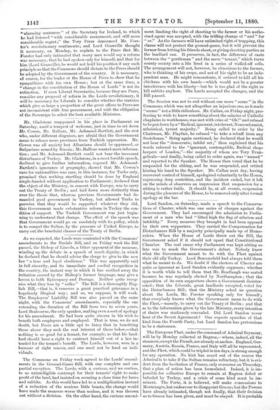As we expected, the Lords were contented with the Commons'
amendments to the Burials Bill, and on Friday week the Bill passed, the Bishop of Lincoln, a bitter opponent of the measure, winding up the debate in a speech of much dignity, in which he declared that he should advise the clergy to give to the new law " a true and loyal obedience." This was apparently said in full sincerity, and its immediate and cordial recognition in the country, the instant way in which it has soothed away the irritation caused by the Bishop's former language, may give a lesson to both Episcopacy and Peerage. Neither quite recog- nise what they lose by " sulks." The Bill is a thoroughly Eng- lish Bill,—that is, it removes a great practical grievance in a hopelessly illogical way ; and so, we suppose, it will work. The Employers' Liability Bill was also passed on the same night, with the Commons' amendments, especially the one extending the duration of the Bill from two to seven years, Lord Brabourne, the only speaker, making even a sort of apology for his amendment. He bad been quite sincere in his wish to benefit both employers and employed. That is true, we do not doubt, but Peers are a little apt to fancy that in benefiting those above they seek the real interest of those below,—that nothing is so good for a tenant, for example, as that his land- lord should have a right to contract himself out of a law in- tended for the tenant's benefit. The Lords, however, were in a humour of right reason, and one need not be hard on indi- viduals.


































 Previous page
Previous page